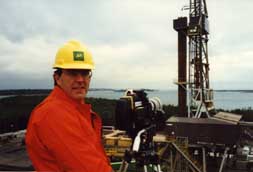It is many years now since documentaries like The Magma Chamber, The Bermuda Triangle and The Power Connection brought the name Geofilms before the public. Its founder, John Simmons FGS, geologist turned BBC documentary maker, is now Agency Director of Oxford and London-based communication agency ON Communication, successor to Geofilms. He talks here to Editor, Ted Nield.
Geoscientist 17.6 June 2007

“Communication brings the delight of telling the stories and sharing the subjects our clients are passionate about” says Simmons. It is almost exactly 10 years since I last interviewed him (Chalk face to Silver Screen Geoscientist 8, 12, p8). I get the feeling that we both like to think our work since then has got smoother and nimbler - in inverse proportion to the degree to which he and I have become more wrinkly and solid.
"ON Communication prides itself in being able to deliver complex messages in ways designed to cut through the noise. It's about getting under the skin of the clients’ audience: talking their language and understanding the context in which the message will be received" he tells me.
John doesn't do TV documentaries any more. Now, ON’s client base is drawn from the geoscience, environment, technology and energy sectors, and includes international players such as BP, Schlumberger, the CO2 Capture Project partnership, and TNK-BP. They have also helped in the production of successful museum exhibitions such as The Power Within permanent exhibition at the Natural History Museum in London.
The company has grown to a core team of 25, many with relevant specialist backgrounds. John's partner, Martine Benoit, is Managing Director, and together, they recognise the need for fresh talent, last year recruiting Anna Coulbeck, a geology graduate and laureate of the Imperial College's Science Media Production Masters course. "ON also draws from the talents of a range of geoscientists, creative and production professionals, here and abroad, hand-picked for the knowledge and experience they can bring to a particular project" says John.
Instead of worrying about ratings and critics, John now finds himself looking elsewhere for his accolades – but finds they are no less satisfying. For example, in 2003, ON began a five-year multimedia safety campaign for BP Exploration and Production, with the aim of raising safety performance around lifting, driving and energy isolation. In the year following the campaign's launch there was a marked improvement. Tangible results like this have brought high praise from some of the most difficult critics in the world – paying business customers. Mike Bowman, BP's Head of Discipline Appraisal & Geoscience is on record as saying: “ON’s combination of professionalism, technical knowledge and ability, along with timely delivery make them the first choice for communication of our technical agenda.”
Total quality
ON spent much of 2004 implementing its Quality Management System. The system ensures that specific procedures are consistently adhered to in every business and production activity, without inhibiting the creative talents on the team. These procedures are tested and improved as the company grows. Then, in March 2005, ON received the news that they had achieved ISO 9001:2000 certification. “It’s great to have recognition that the quality of our business improvement processes matches the quality of our products and services" says Simmons.
But didn't the small screen and its potential millions of viewers still beckon? I asked John whether it was the way TV programmes are commissioned today that had made him withdraw from that area.
"Television in the UK has evolved - I expect Geoscientist readers will have their own view on what has happened to “the world’s least worst TV" as it was often called. In the 80s, when the government changed the way the BBC had to operate so that the anarchic, but fabulously successful cadre of dedicated programme makers, had to pursue audience numbers rather than excellence, the writing was on the wall for many small companies like us who were producing hand-crafted programmes. Excellence and high audience ratings are not mutually exclusive, but difficult to produce repeatedly.
Also, to feed the demand for audience share, television commissioners rapidly equated geosciences with volcanoes, dinosaurs and earthquakes, part of the ‘weather porn’ movement that has seen disaster, death and destruction becoming the main agenda items for many broadcasters. It astonishes me that there is still an audience interested in watching yet another catalogue of volcanic eruption footage loosely cut to a not particularly relevant narration. Maurice and Katya Krafft, the French volcanological film-makers were doing a better and more truthful job of this in the late 60s.”
"It became clear that the world we knew was evolving in a different direction from us, and therefore to survive intellectually and to prosper, we had to focus on clients with whom we shared a mindset - and high standards. Gladly, we have."
"Our clients today are mainly in the energy sector, although environmental communications have been a significant part of the business for some years. As we speak we have projects for customers from Russia, North Africa, Trinidad, Canada, the USA and the UK. Our biggest client is BP with whom we have been working with for over 20 years, producing films, books, exhibitions, manuals, digital projects and providing communications consultancy on a vast range of their activities. We also have clients in the Forensic sciences, Biotechnology and Medicine. We are hoping that the opening of our new office, (just around the corner from the Geological Society) will bring opportunities for new clients, primarily in the extractive industries. Now we’re planning an in office in Houston!”